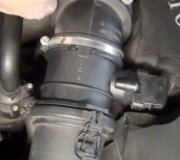If no check engine light on and system all OK, driving it should get it complete
if have any pending codes, have to be repaired 1st
check if have the correct operation temp
as most monitor need to see an operating temp before can run test
This what I have for information and how to complete a drive cycle on a dodge and jeep product.
The following procedure has been established to assist technicians in the field with enabling and running OBD-II Monitors on FWD cars and FWD/AWD vans equipped with Single Board Engine Controller (SBEC). The order listed in the following procedure is intended to allow the technician to effectively complete each monitor and to set the CARB Readiness Status in the least time possible.
NOTE:Once the monitor run process has begun, DO NOT turn off the ignition. By turning the ignition key off, the monitor enabling conditions will be lost. Only the O2 Heater Monitor runs after key off.
NOTE:By performing a battery disconnect, or erasing diagnostic trouble codes, the CARB Readiness and all additional OBD information will be cleared.
Monitor Run Process Tip
The following is an outline of the Monitoring Run Process, including suggestions and tips in order to aid in the process of meeting the enabling criteria for these monitors. The most efficient order has been outlined below, the first two monitors have very similar enable criteria, so it is possible that the Evaporative Leak Detection Monitor will run while operating the vehicle to enable the Catalyst Monitor.
Evaporative Leak Detection Monitor (If Equipped)
This monitor requires a cold start, usually an overnight soak or parked for at least 8 hours without the engine running. The engine coolant temperature must be within 10 degrees of ambient/battery temperature, and the sensed Ambient (outside) temperature must be between approximately 40 °F and 90 °F.
Catalyst Monitor
Tips Click a link to view tip
Tech1Question: CAT READNIESS
The vehicle will need to be driven at a steady highway speed for a few minutes. The monitor will typically enable and start running around 45 to 60 mph under normal driving conditions. If the vehicle is equipped with a manual transmission, using 4th gear may assist in meeting the monitor running criteria.
EGR Monitor
The EGR monitor enable conditions are basically that the vehicle is in closed loop operation and coolant temperature above 170 °F. It is necessary to maintain the TPS, MAP, MPH and RPM ranges at a constant with very little fluctuation to allow the monitor to complete during the cycle.
O2 Sensor Monitor
The vehicle will need to be driven for a period of time at highway speeds and brought to a complete stop for a short period of time, with the A/T left in Drive the monitor should run. The O2 Monitor will not run in Park or Neutral on A/T equipped vehicles.
Purge Monitor
The Purge Free cells must be updated before the monitor will run. The enabling conditions are similar to the O2 Sensor Monitor enabling conditions such as, the vehicle will need to be driven for a period of time at highway speeds and brought to a complete stop. The Purge Flow Monitor will attempt to run every OTHER throttle closure. If all of the parameters are met and it still does not run, with your foot firmly on the Brake, quickly open and close the throttle, this will allow another Purge Free update, and then the Purge Flow Monitor should run.
O2 Sensor Heater Monitor
The vehicle will need to be driven for a period of time at highway speeds to satisfy the enabling conditions for the O2 Sensor Heater Monitor. The monitor runs with the ignition key off after vehicle operation. Allow the vehicle to hot soak for a few minutes before checking to determine if the monitor completed the cycle. Turning the key on prematurely will abort the monitor test and the vehicle will have to be driven to arm the enabling conditions again.
Misfire Monitor
Misfire monitor is continuously running during engine operation. For the Misfire monitor to be enabled, the Adaptive Numerator must be learned since battery disconnect and every Key on there after (known as Power-on learning).
The Adaptive Numerator is a software learning routine that tells the PCM where the crankshaft slots are. Since every crankshaft is different, the PCM must learn exactly where its particular crankshaft slots are; otherwise its RPM calculations would be wrong. After a battery disconnect and then a power-up of the PCM, the Adaptive Numerator is set to a value which it would be at if everything were perfect (crankshaft slots, sensors, PCM hardware, etc.). If the Adaptive Numerator is equal to the default value, no learning has happened and the Misfire Monitor will not run.
To allow the PCM to learn the Adaptive Numerator, the following must happen:
Open Throttle.
Engine Cool Temp Above 100 °F, Or If Below 100 °F Wait for ECT Rise of 59 °F.
More Than 10" Vacuum.
Above 1200 RPM.
Below 3000 RPM - A/T.
Below 3488 RPM - M/T.
Once the PCM has learned the Adaptive Numerator, the Misfire Monitor will run.
Fuel System Monitor
Fuel System monitor is continuously running during engine operation.
Wednesday, June 16th, 2010 AT 5:31 AM



